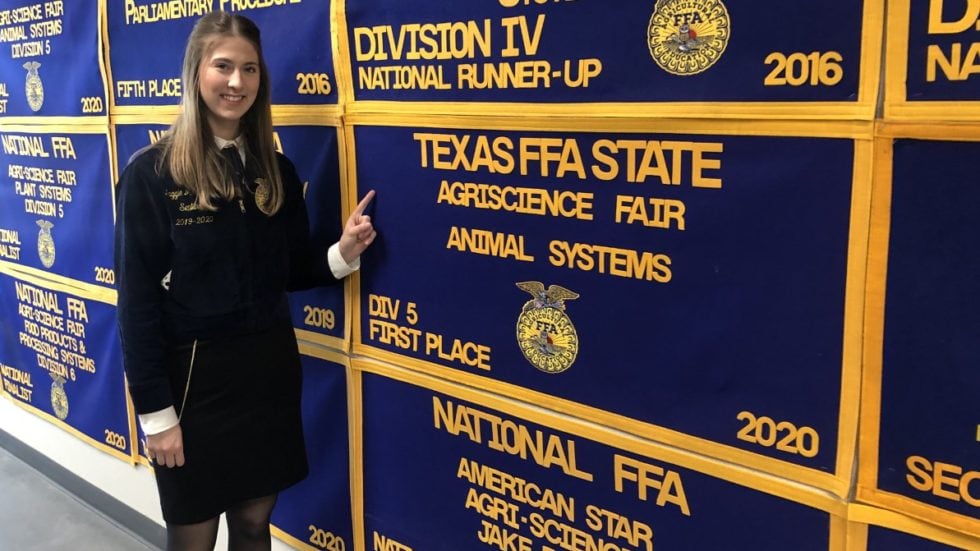Maggie McGregor is a senior at Stephenville High School and is a proud member of the Stephenville FFA. Throughout her FFA career, Maggie has achieved great success, which she contributes to her dedicated advisors and school district for its continuous support of her chapter.
Maggie shared with us her most recent success at the 2021 Houston Livestock Show and Rodeo Science Fair, where she completed an extensive research project on the effects of additives on poultry growth. Learn more about Maggie’s project and the advice she has for agricultural students below.
The Project Phases
Maggie’s research was a quantitative study requiring in-depth observations and measurements over several months. A majority of her junior year of high school and summer were devoted to completing her research project.

Planning & Preparation: Extensive planning and preparation took place before Maggie could begin her project to ensure all materials, equipment, and courses of action were readily available.
Calming Phase: Once Maggie received the chicks, she began what she calls the calming phase. During this phase, all the chicks were provided water with no additives for two weeks to establish a baseline and ensure a high level of accuracy during data collection.
Treatment Phase: The treatment phase took approximately nine weeks, and during this phase, four groups- antibiotics, electrolytes, probiotics, and a control group with no additives- were selected as the final treatment groups. Each group, minus the control, was provided freshwater with additives and free choice feed daily. The birds were weighed at the end of each week to calculate their growth rate. During the final week of treatment, the final live bird weight and breast width were measured.
Withdrawal Phase: Each group entered a two-week withdrawal period to ensure any additives had time to exit the birds’ systems before production.
Production & Post-Production: The birds were packaged and transported to a production site by Jennifer McGregor, Maggie’s mother, and Miss Bowers, Maggie’s agricultural science teacher, to be processed. Then all 120 birds’ carcasses’ were weighed after processing to determine their final measurements.
Analyzing & Reporting: After collecting the final measurements, Maggie ran statistics on the SPSS version 24 system. She then analyzed the data to find trends and composed her conclusions into a well-written research paper.
*The whole experimental process took approximately 5 to 6 months to complete, with an additional 2 to 3 months to compose the research paper.
The Results
Although the data did not have any statistical significance, the trends proved that the antibiotic group had the highest live and carcass weights (shown by a p-value less than or equal to 0.05). Based upon this information, Maggie concluded that the birds that received the antibiotic treatment had more efficient growth rates when compared to the control and other additive groups. However, the other additives, electrolyte and probiotic, were not too far behind in growth rates.
Maggie’s research aimed to respond to consumer concerns over antibiotic additives used within the agricultural community. Her response to those who are concerned is, “Any additives contributed to the growth of chickens and or any animal is not harmful for consumption as there is a legal requirement for withdrawal periods for any additives. The purpose is to improve efficiency within production as the world population is constantly growing. Agriculturalists are challenged daily to produce new technology, methods, and ways to be efficient. While agriculturists are trying to feed the mouths of billions, they are constantly criticized for the hard work they do. Appreciate these men and women that are in the agricultural industry because they do what the common person could never.”
Advice for Students
Maggie’s favorite part about competing in livestock shows is getting to share her work and advocate for the agricultural industry. She recommends to all students attending any upcoming livestock shows, whether for showing livestock, presenting a project, or attending an LDE or CDE contest, to remember, “failure is going to do a lot more for you than winning.” Maggie says her failures have pushed her to her big wins in life, as she uses these lows as motivation to do better and succeed. Secondly, Maggie recommends to simply have fun! While accomplishing things is essential in life, so is enjoying the little things along the way.
Maggie McGregor has accomplished great things throughout her time in FFA and continues to amaze us. Her project on the effects of additives in the poultry industry is not only impressive but relevant in today’s society. Other kids hoping to make a difference like Maggie should consider joining FFA to expand their knowledge and skills. To find a local FFA chapter near you, visit the National FFA website.

